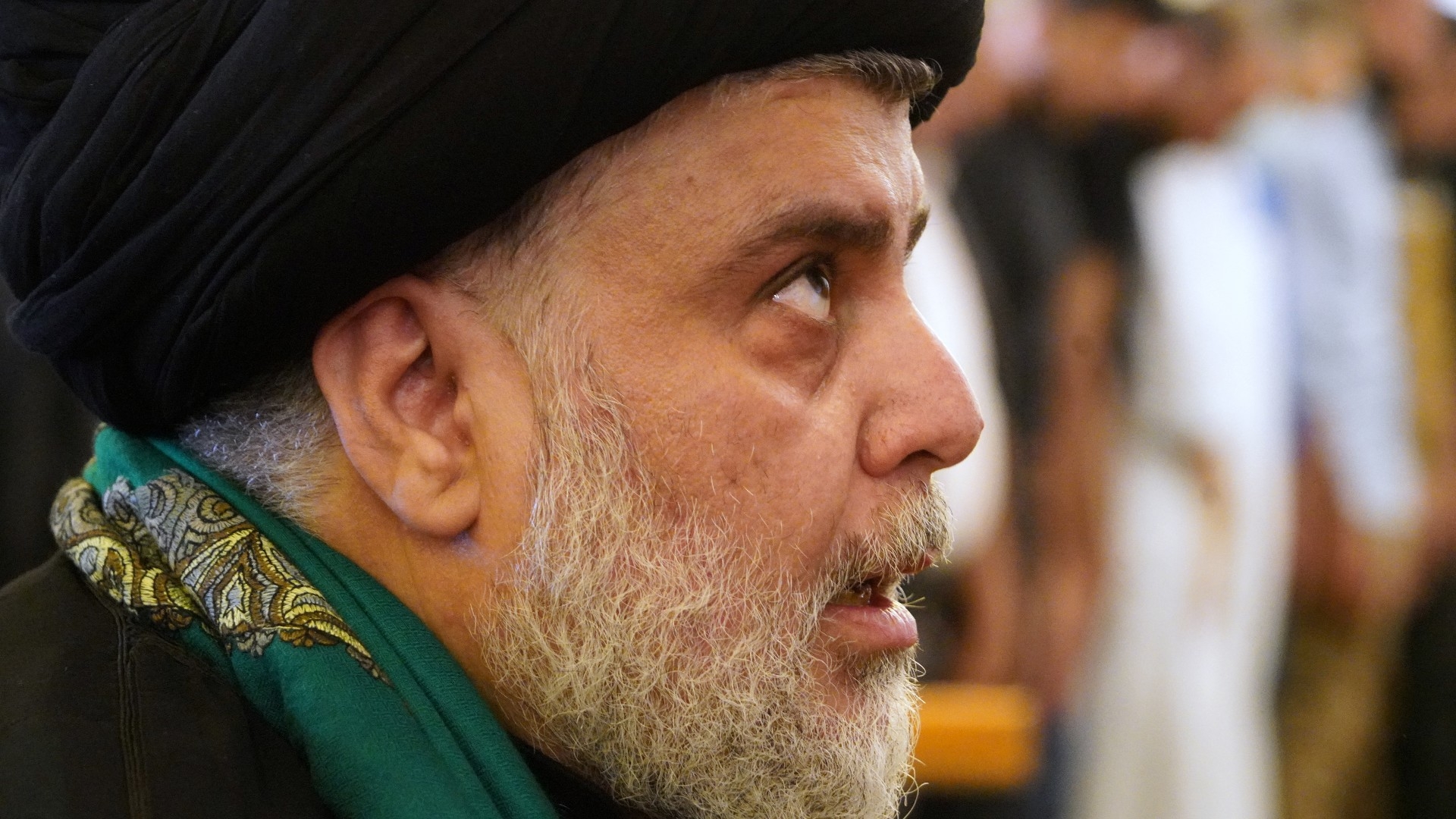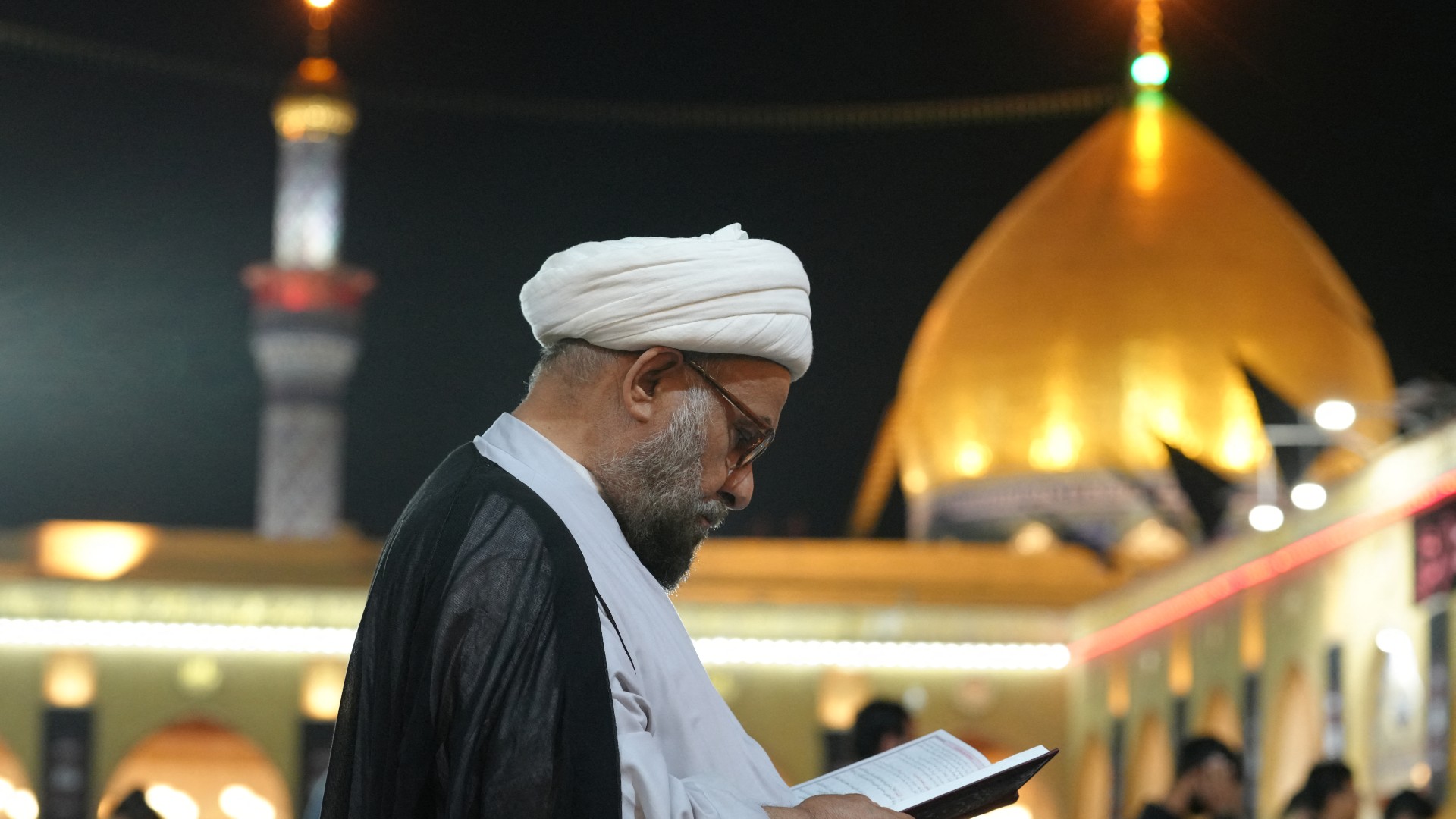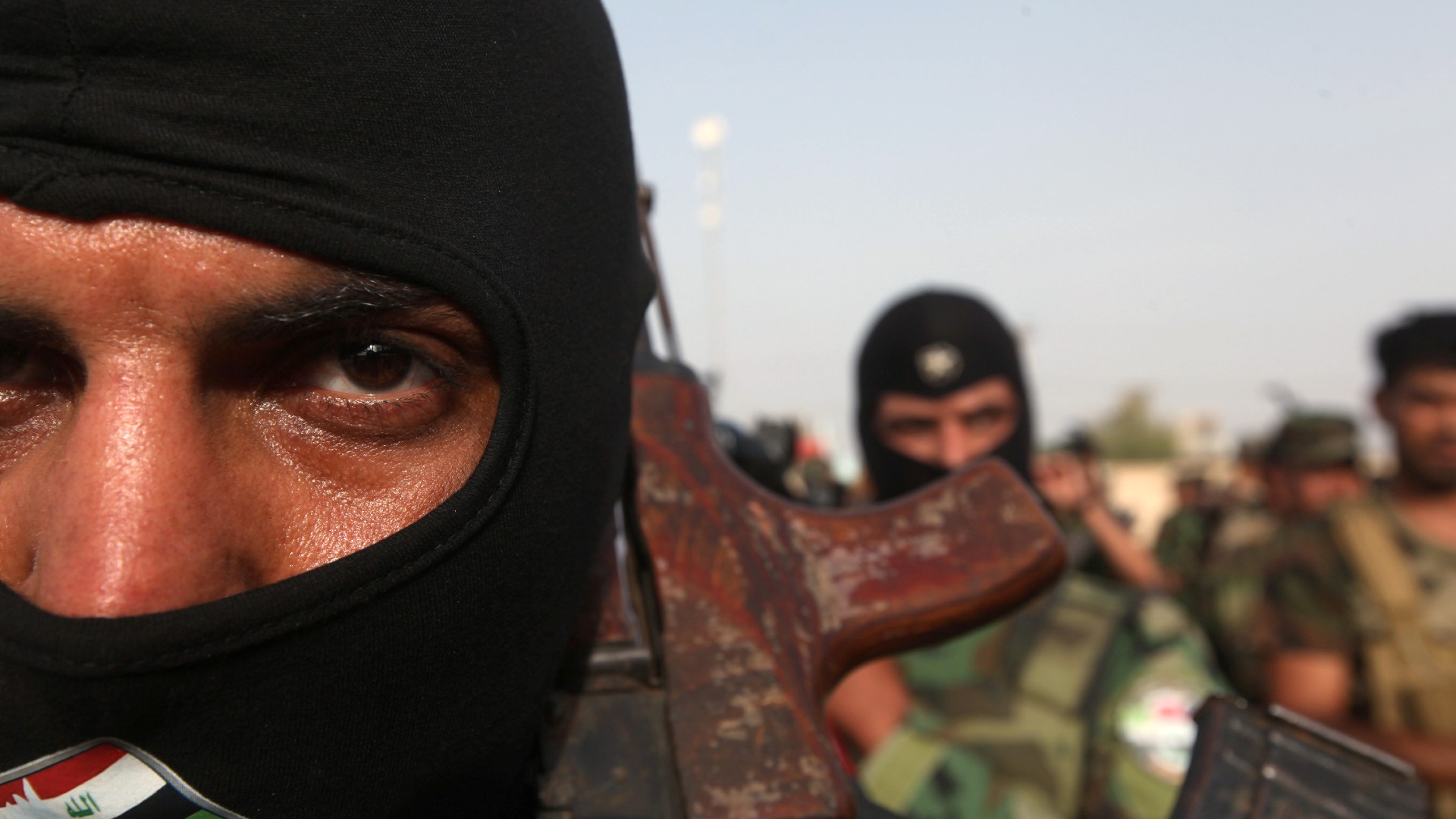How Sadr's foes are trying to suck him back into Iraqi public life

As the final days of the holy month of Ramadan approached, Muqtada al-Sadr busied himself with preparations for his annual itikaf, a period of reflection to be spent in the great mosque of Kufa.
To those around him, it seemed clear he was trying to divert his attention away from events in the world outside the walls of his home in central Najaf's Hanana.
It has been almost a year since the influential Shia cleric announced his withdrawal from politics. Over the past few months, as a new Iraqi government was formed without his participation, he resolutely refused to enter into any political dialogue or receive visitors trying to speak to him about developments or issues the country was facing.
Sadr's entourage could see how difficult it was for Sadr to remain calm as he made his arrangements for the three-day Kufa mosque retreat. It was plainly difficult for him to stay away from the daily drama of Iraqi politics.
Sadr had just a few days before he was due to head to Kufa. He asked who would join him in itikaf, and what food they would be given for their days of reflection, one of Sadr's close aides told Middle East Eye.
Stay informed with MEE's newsletters
Sign up to get the latest alerts, insights and analysis, starting with Turkey Unpacked
Everyone told him everything was as he wanted it and that there was nothing to worry about. But that wasn't quite true.
On 13 April, immediately after the evening prayer, a short video began circulating on social media. In it, a bearded young man appears wearing black religious garb, his face hidden behind a black mask. The figure called on everyone to pledge their allegiance to Sadr, identifying him as the Mahdi, the awaited twelfth imam of the Shia who, it is believed, will appear as a saviour to bring justice to all.
'Owners of the cause'
The masked man said that the Kufa mosque would witness the launch of a "big campaign" to declare allegiance to Sadr during his stay there.
"We will pledge allegiance to him and announce that he is the awaited imam, and we will be under his banner and support him," the man said.
"Do not let down the imam of your time. Give your allegiance to him and support him."
'That [video] was an explicit threat to Sadr's life and a threat of chaos'
- aide to Moqtadr al-Sadr
Hours later, dozens of Sadr's supporters, who call themselves "owners of the cause", gathered in Hanana in front of his house to declare their allegiance.
To their surprise, Sadr's guards did not greet them, instead assaulting the rapturous Sadrists and handing them over to the police, local sources told MEE.
Sadr already knew that there were some among the most devoted in the Sadrist movement who believe he is the Mahdi, and footage like the video of the masked man was not particularly unusual. But for some reason, the developments "provoked him a lot, and raised his fears," Sadr's aide said.
Rather than being a show of support, the video was seen as an attempt to destabilise Sadr.
"That was an explicit threat to Sadr's life and a threat of chaos," the aide told MEE.
According to the aide, whoever was behind the video wanted to provoke Sadrists into massing at the Kufa mosque and then confronting Shia clergy in Najaf, who would not accept the claim Sadr is their long-awaited saviour.
"These people are very dangerous and can carry out crimes in the name of Sadr," he said.
If this analysis is correct, Sadr's response showed he understood well what was at play and decided to distance himself from it as soon as possible.
He cancelled his itikaf, ordered most of his offices closed, and suspended his movement's religious and social work for at least a year.
At least three prominent Shia leaders told MEE that "a malicious plan was behind that movement", and that Sadr was indeed a target.
"It was an ideological game aimed at manipulating Sadr and inflating his ego. If he remained silent or responded to the game positively, then killing him became legitimate," one of the leaders said.
"Whoever was behind this scheme, he was seeking to implicate Sadr and to force him in one way or another to take a stand."
Since that day, Sadr has only been dealt further painful blows, both by his political opponents and people closer to home. It seems more than one player is trying to drag him out of his seclusion.
The fatwa loophole
In Shia jurisprudence, adult Muslims must choose a senior cleric to be their religious reference - or marjaa - and follow his fatwas and instructions in all matters of life.
Traditionally, that marjaa must be alive and known for his religious scholarship. But the two founders of the Sadrist movement, Muhammad Baqir al-Sadr and Muhammad Muhammad Sadiq al-Sadr, stressed that a marjaa should be the most knowledgeable cleric available - alive or dead.
Grand Ayatollah Kadhim al-Haeri, who was a student of the first Sadr and guardian of the second, did not deviate from this line. In fact, he issued a fatwa allowing people to follow a dead marjaa, as long as they have the permission of a living one, like himself.
When Muhammad Muhammad Sadiq al-Sadr was assassinated by Saddam Hussein's agents in 1999, the Sadrists began to follow Haeri spiritually and the slain Sadr's son, Muqtada, politically.
Haeri also gave Muqtada al-Sadr permission to manage his father’s office and religious schools, as well as the funds raised through khums (obligatory religious charity) and donations.
This arrangement benefitted Sadr considerably and helped keep the Sadrist movement together under his leadership, particularly keeping the loyalty of youth born following his father’s death.
This situation changed completely at the end of August last year, when Haeri, who is based in the Iranian city of Qom, announced his "sudden and unprecedented" retirement "due to illness and advanced age".
In his announcement, Haeri rescinded his permission for Sadr to manage the movement's funds and activities.
"Sayyid Haeri's sudden retirement confused Sadr and greatly embarrassed him," Khalid al-Hamdani, professor at Najaf's scientific seminary, told MEE.
"Retirement is not customary among Najaf clergymen... so everyone was surprised by it, including the offices of Sadr and Haeri himself. That retirement has impacted all the arrangements between Sadr's and Haeri's offices dating back to 2003."
Haeri's retirement prompted Sadr to suspend the work of the Sadrist religious schools and institutions, and he stopped receiving the khums.
Not only did he lose access to the hundreds of millions of dollars they brought in, he haemorrhaged followers as well.
Only adding to the "shocking" and "strange" nature of Haeri's announcement, as a number of Shia scholars in Najaf described it, was the order for the marjaa's followers to "obey" Iranian Supreme Leader Ali Khamenei instead.
"Herein lies the danger," said a prominent Sadrist leader. Previously, Sadrists would be embarrassed following Khamenei spiritually, and therefore working with the Iraqi armed factions associated with the Iranian supreme leader.
But not only had Haeri embarrassed Sadr by associating him with Khamenei, whom he had long kept a distance from, he had opened the door for Sadrists to consider other clerics as their marjaa rather than Muhammad Muhammad Sadiq al-Sadr.
"Can you imagine what happened? The semi-closed circle, which Sadr was keen to keep the Sadrists inside, has broken, and this is what Sadr never expected to happen," Sadr's aide said.
Today, Sadr's status is a hot topic of discussion, with Haeri's announcement opening the door for the cleric's Shia rivals to question his legitimacy at every opportunity.
'Frankly, the issue is far from jurisprudence, religion and faith. It is a struggle over the Sadrist grassroots'
- Former Sadr aide
Dozens of Telegram channels, WhatsApp groups and Facebook pages, some of them linked to Shia armed factions and others of unknown affiliation, have been heavily promoting the debate for weeks.
It seems clear that the real threat facing Sadr is political, not ideological, especially after his opponents, the Shia rivals in particular, have realised that his main source of strength is the same as his main source of weakness: Haeri's fatwa.
In response, Sadr has tried to shore up his support.
On 29 April, he asked his followers to submit a written pledge signed in blood where they promised not to follow any religious scholar who has not been a longstanding Sadrist. They also had to vow not to join any "suspicious groups that want to undermine Iraq, the sect and the Sadrist movement".
Sadr was keen to stress to his followers that his enemies had "malicious plans" aimed at dispersing the Sadrist movement and encouraging them to question their marjaa or leader - Sadr himself.
"Frankly, the issue is far from jurisprudence, religion and faith. It is a struggle over the Sadrist grassroots," said a former Sadr aide, who a few years ago defected to an Iranian-backed armed faction.
"Questioning Sadr's religious and ideological authority, and raising questions about the nature of the relationship between him and his followers, is one of the weapons used in the battle and we all know this.”
The former aide acknowledged the cleric relies heavily on the movement's youngest generation but also said these youth remain committed to him spiritually and politically.
"Fortifying these people and keeping them under control, away from the influence of opponents, is Sadr's chief goal right now," he said.
Fraternal competition
Sadr's fiercest opponents are his former companions: followers of his father and uncle, people he has gone into battle with.
Most prominent are Shia armed factions Asaib Ahl al-Haq and Kataeb Hezbollah, who have ideological, demographic and territorial overlap with the Sadrist movement.
The three factions emerged from the same school of jurisprudence that was founded by the first Sadr leader, Muhammad Baqir, Sadr's uncle and father-in-law.
This demographic and ideological crossover complicates the competition between the factions, making their fight even more cruel.
And the fraternal nature of their competition means the Sadrists, Asaib Ahl al-Haq and Kataeb Hezbollah know exactly how to undermine each other and tempt their fighters away.
This dynamic dramatically and publicly revealed itself earlier this month.
On 6 May, Sadr instructed his supporters to mark the annual anniversary of the assassination of his father later in the month.
Only those who had signed the pledges in blood were allowed to participate in the Najaf ceremony, provided they walk on foot from the outskirts of the holy city to the place where Sadr senior was killed.
Sadr's stipulations and planned march were a message to his opponents, one of the cleric's aides told MEE. He was showing his rivals that only he could move such vast crowds of devotees.
"The plan was for everyone to see the number of those willing to die for Sadr. We do not deny that the goal was to display our strength and our men," the aide said.
Just days before the parade was due to take place, it was cancelled.
Sadr's office distributed an audio recording of the cleric, in which he ordered everyone to stop preparations and close Sadr's shrine in Najaf throughout the last week of May, when the anniversary was due to fall.
This was "the best punishment for this hypocritical group and those who support them among the corrupt and shameless militias", Sadr is heard saying, using a common nickname he has for Asaib Ahl al-Haq.
No other reason was given. But developments in the southern governorates of Basra and Nasiriyah in recent weeks offer some clues.
Internal Sadrist correspondence seen by Middle East Eye shows in late April the central security branch of Saraya al-Salam, the Sadrists' armed wing, ordered the expulsion of 18 fighters from the 304th Basra Brigade, without mentioning why.
A senior Saraya al-Salam commander in Basra told MEE that the fighters were believed to be defecting to Asaib.
Two weeks later, the same branch ordered the expulsion of Abu Hassan al-Daradji, a senior commander in Basra, on charges of "treason", the correspondence shows.
Twenty-four hours later, websites linked to Asaib published pictures of Darraji accompanied by a number of the armed faction's leaders, announcing his defection.
"Our information says that they paid him at least 2bn dinars [$1.5m] to defect from us, along with his unit," the Saraya al-Salam commander told MEE.
It is not clear what material damage Darraji's defection caused Sadr's Basra units, but by the reactions of Asaib Ahl al-Haq, we can see it was a blow to morale.
Local Sadrist leaders in Basra told MEE that Daradji had been made commander of Asaib's special missions team.
"They wanted to tell us that this was his reward," the Saraya al-Salam commander told MEE.
Wanting Sadr back
The Sadrist retreat began in June last year, when, frustrated by his inability to form a government, Sadr ordered his MPs to resign from parliament.
That allowed Sadr's Shia rivals in the Coordination Framework alliance to form the government of their choice. It seemed like an incredible coup for them. Months later, it appears more like a trap.
Iraq has witnessed a period of relative calm in recent months. Leaders of the Coordination Framework, which includes most Iranian-backed political forces and armed factions, have gone about their business without obvious concerns.
Yet Shia political leaders told MEE that fears are beginning to surface.
Some of the biggest concerns expressed by Framework leaders is that some of their partners in the Shia alliance are "encroaching" on their territory and have control over key institutions.
Essentially, the organs of state are a lucrative business for whoever controls them.
'It is certain that several international and local parties are seeking to bring Sadr back to the scene'
- Coordination Framework leader
While Sadrists had powerful positions in government, anyone pursuing illegal and corrupt activities could accuse them of being responsible instead, giving them plausible deniability.
With that no longer possible, Sadr's friends and enemies alike find they miss him and wish for his return to political life, "to relieve them of embarrassment and to provide them with the required cover for their illegal business", as a Framework leader put it.
"Many international and local parties believe that Sadr's presence outside the political process is more costly than his presence inside it, and it is time for him to return," the Framework leader said.
According to the leader, Asaib Ahl al-Haq has begun taking more shares of the spoils of government than its partners are happy with.
"If it stays like this, this faction will turn on the rest and swallow them up," he said.
"Others have become exposed and cannot proceed with their illegal activities without the presence of someone that they can use as a cover to throw the charge at."
Sadr, the Framework leader said, is a "tool of deterrence" and provides a kind of protection for several parties.
"It cannot be said that only one player is behind everything that is happening with Sadr now, but it is certain that several international and local parties are seeking to bring him back to the scene," he said.
"How and when will he return? This mainly depends on his ability to hold on."
Middle East Eye delivers independent and unrivalled coverage and analysis of the Middle East, North Africa and beyond. To learn more about republishing this content and the associated fees, please fill out this form. More about MEE can be found here.








